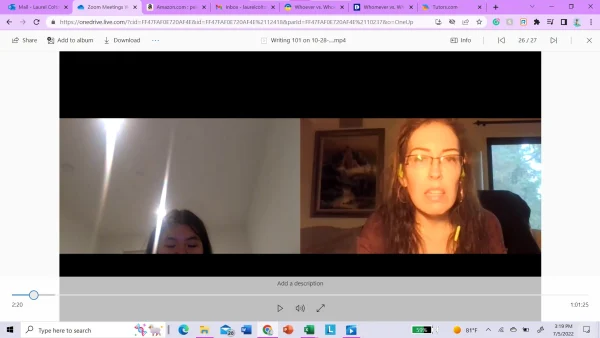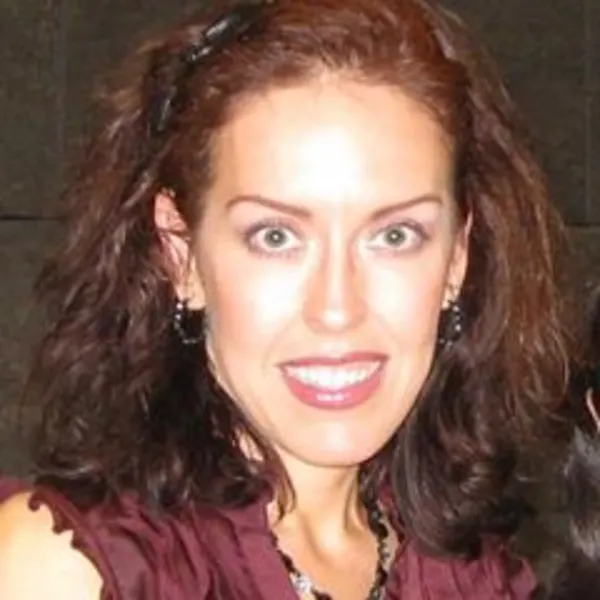Laurel's Online Tutoring
About
Everyone has a calling; education is mine. I consider myself a life-long learner, and I learn something new through each student I tutor. I tutor students online in fifth grade through college and beyond in English (e.g., grammar, punctuation, spelling, vocabulary), reading comprehension, writing (e.g., essays, MLA and APA style formats) speech/public speaking, and Psychology. I love to use my imagination and enjoy helping students with creative writing and poetry as well. I have tutored high school students in AP Psychology to help prepare them for the AP exam. Research writing is one of my sub-specialties, and I am always happy to provide instruction and feedback on research papers and proposals in APA format for undergraduate and graduate students.
My M.S. and Ph.D. are in experimental psychology, and I have taught introductory psychology, developmental psychology, history of psychology, psychology of women, and learning theory at the college level. I received my Bachelors degree in psychology (major) and philosophy (minor). I currently work full-time as Lead Tutor for an online charter school from late August to early June; however, I am available for private tutoring on weekday evenings and on Saturdays. During the summer, my weekdays are more flexible.
Developing good study skills is a key focus of my tutoring because many students want to improve their performance on quizzes and tests. Consequently, I recommend memorization and learning strategies students can use to study more effectively. My understanding of age-appropriate activities for children helps me select topics and tasks that keep them engaged. I have limited experience teaching students with learning disabilities, however. Most importantly, I model and reinforce positive core values like integrity, reliability, and honesty. I tutor online due to my busy schedule and the number of students with whom I meet.
The most gratifying aspect of tutoring for me is the look on a student's face when he or she grasps a new concept or way of doing something that works well for them. Sometimes the process of finding the right path to that understanding is a challenge, but I go at each student's pace, encouraging their questions and rewarding their successes as they progress. I want them to feel comfortable asking for help when they need it but willing to try on their own. My primary goal is to leave each student with an insatiable curiosity and a desire to learn -- two things I believe give our lives meaning.
Highlights
Payment methods
Specialties
Grade level
Subject
Photos and videos


Reviews
Lisa L.
fang Y.
sergei G.
Simona T.
Arash S.
Reina T.
Frequently asked questions
What is your typical process for working with a new student?
I start with a meet-and-greet with the student to get a clear idea about goals for tutoring. This gives the student a chance to get to know me a bit also. I usually start with a one-hour session to see how it goes for the student. If he or she requires more time for instruction, tutorials may be scheduled in 90-minute or two-hour sessions. If the student has assignments from a teacher at school, we can work on those. Otherwise, I ask for specific areas in which improvement is sought and obtain the appropriate materials to review during tutorials. Since every student's needs are unique, I tailor any materials I provide to each student. I can give homework if the student needs extra practice with the skills we cover during our tutorials. Unless the student or their family tells me what they want me to focus on with the student, I usually give basic assessments or quizzes during the first meeting to identify areas in which the student needs help and to determine where we should start. Based on this, I make a list of topics to cover in future tutorials. I will periodically give reassessments to check on how the student is progressing with the skills we have been practicing and to chart their improvement. I often ask about students' progress in their courses and appreciate hearing about grades they receive on papers or tests they prepare for with me. This helps me know if our tutorials have been effective.
What education and/or training do you have that relates to your work?
My M.S. and Ph.D. from the University of Wisconsin-Milwaukee are in experimental psychology, and I have taught psychology courses at the college level. I have certifications as an Advanced Tutor and Professional Reading Tutor from the National Tutoring Association. I have been tutoring privately and have been an instructor for AP Psychology since 2019. Prior to that I was a college professor in psychology and also worked with non-profit organizations. For the past three years, I have been employed as the Lead Tutor for California Pacific Charter Schools and run their Virtual Learning Hub (online study hall), overseeing 10 other tutors who work with students in grades K-12.
Do you have a standard pricing system for your lessons? If so, please share the details here.
My usual rate for general tutoring is $35/hour. Tutoring for AP Psychology and undergraduate/graduate research writing is $40/hour. The minimum session time is one hour (online). The first session is 50% off.
My tutoring fee helps cover my access to appropriate teaching materials for the student's subject area and grade level not provided by the student or family. As a self-employed tutor, I pay taxes and have a business license, the costs of which necessarily factor into my expenses. However, I do my best to keep my fee as affordable as possible.
Cancellations less than 24 hours in advance will be charged in full since it is not possible for me to recoup that lost time by scheduling another student last minute.
How did you get started teaching?
When I began teaching as a graduate student, I was terrified at first. But I quickly became addicted. I was a teaching assistant in psychology courses and helped undergraduates with their APA-format research papers and exam preparation. I conducted discussion and laboratory sections for these courses, and students met with me more often than with the course professor. They taught me so much about teaching. Soon, I began teaching summer courses on my own for 5th-8th graders on "How Animals Learn", and those classes were a blast! By the end of graduate school, I was teaching my own courses for undergraduates as an instructor at the University of Wisconsin-Milwaukee. After I received my Ph.D., I began teaching as an Assistant Professor of Psychology at Western New England College (now University). There, I taught a variety of psychology courses and advised undergraduates in their independent study projects. This began my twenty-year journey through teaching in various forms and locations, and I have enjoyed every minute!
What types of students have you worked with?
I have worked with many different students from children to adults. For some, English has been their second language; however, I do not have formal training in ELD/ESL. My students have come from all ethnic and socioeconomic backgrounds. Many of them have helped me learn about cultures other than my own, and I enjoy working with a diverse group of students.
Describe a recent event you are fond of.
One of my recent students at Pasadena City College was working on a final paper for her English class, and after we finished editing it together, she got an A on the paper. In fact, she received an A in her class. We had worked together all semester, so I was thrilled and very proud of her.
Recently, I learned that a 12th-grader I helped with his college essays just got accepted to the university of his choice. In fact, nearly all of the schools to which he applied offered him admission. I cannot take credit for all of his years of hard work throughout high school, but it made me feel good to know that I was able to help him produce well-written essays for his college applications.
What advice would you give a student looking to hire a teacher in your area of expertise?
Look for a tutor who is not only knowledgeable in the subject you are studying but someone you are comfortable with so that you feel free to ask him or her questions. Communication is key in tutoring. There needs to be open communication so that you can get what you need from your tutor. Don't be afraid to speak up and ask for what you need. Tutors are not mind-readers.
Think about what you need to work on BEFORE you meet with your tutor, and bring work that you need to get done to your tutorial. Don't rely on the tutor to be like your teacher or professor at school, who shows up with everything you need. If that is what you are looking for, then you will want to hire an instructor or enroll in a course on your subject instead of working with a tutor. If you won't be bringing your own materials to work on, you should let your tutor know this so that he/she can obtain the necessary materials to do their own practice exercises with you because some tutors will do that.
To get the most out of tutoring, you need to be invested in it yourself. So don't expect your tutor to do your work for you; you won't benefit from tutoring that way. Even if you do get a good grade on your paper, if the tutor writes most of it for you, you probably won't learn much and will become dependent on the tutor. The job of any good tutor is to eventually get themselves fired because you have learned what you need to know and don't need the tutor anymore!
Finally, to benefit more from tutorials, give your tutor a heads-up on what you are working on next in your class. Then, formulate a plan with your tutor so that your time can be used most effectively in the next session.
What questions should students think through before talking to teachers about their needs?
Be clear about the type of English and/or writing help you need. For instance, if you are focusing mainly on literary analysis essays written about various works of fiction, and you need help figuring out themes, character analysis, and plots, you probably need a literature tutor who has read the text you are writing about. Not every ELA/English or writing tutor has this expertise or experience. If they do not, they will need to read and analyze the text on their own time so that they can help you (if they are willing to do this extra work). Generally speaking, writing tutors help students improve their writing skills, but they may not be up to speed on the specific texts you are writing about. Keep this in mind and know that you may need to provide the content of your papers while the writing tutor helps you put your ideas into words using correct grammar, punctuation, style, and tone. You may want to ask the tutor if they are a "literature tutor" if that is what you really need.
If there are other topics you need help with, write them down so that you can ask the tutor about them during your phone interview or first trial meeting.